六级听力练习IV
- 格式:doc
- 大小:34.50 KB
- 文档页数:7
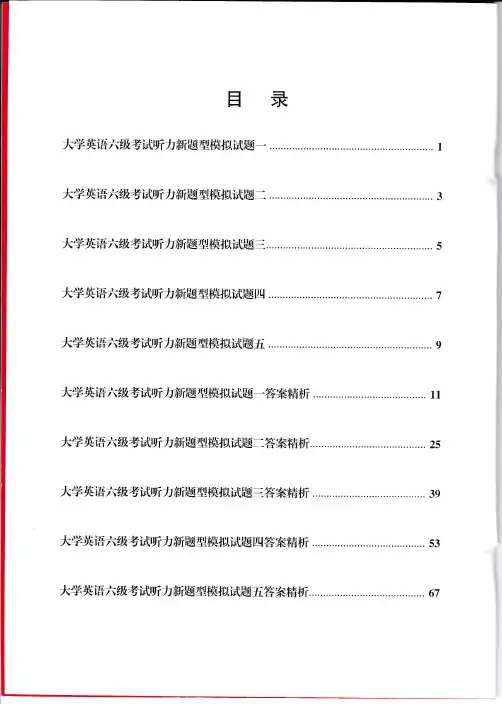
大学英语六级考试昕力新题型模拟试题四Part II Section A Listening Comprehension (30 minutes)Directions: In this section, you will hear two long conνersations. At the end of each conνersation, you will hear some questions. Both the conversation and the questions will be spoken on抄once.A卢er you hear a question, you must choose the best answer from the four choices marked A), B ), C) and D ). Then mark the corresponding letteron Answer Sheet 1 with a single line through the centre.Conversation OneQuestions 1 to 4 are based on the conversation you have just heard.L A) To app l y for a student loan.C)To ask for a letter of recommendation.B)To discuss a decision be has to make.D)To也1d out which colleges accepted him.2.A) The laboratories are not well equipped.C)It’s too expensive.B)The classes are too larg巳D)It’s too far away仕om home.3.A) It has a b巳autiful campus.C)It’s in an urban s巳仕ing.B) Professors regularly p ublish their academic results. D) Faculty members interact with students.4.A) H e is outgoing.C) H e is troublesome.B) H e is handsome.D) H e is honest.Conversation TwoQuestions 5 to 8 are based on the conversation you have just heard.5.A) B ecause she is Professor B ill's daughter.B) B ecause she works part-t ime as Professor Bill’s secr巳tary.C)B巳cause she us巳d to do the j ob hers巳lf.D) B ecause sh巳just came out of an interview for the job.6.A) It should be higher.·C) It’s the same as that of school post office.B)It’s very good.D)It varies according to the person’s experience.7.A) Make up homework problem sets.C)Teach an economics courseB)Do r巳search in the laboratory.D)Grade hom巳work sets.8.A) H e wonders if he'll have enough time to do the job.B) H e is afraid he doesn't know enough to do the j ob well.C) H e fears that the j ob may be too boring.D) H e think:s Professor B ill has someone else in mind.Section BDirections: In this section, you will hear two passages. At the end of each passage, you will hear some questions. Both the passage and the questions will be spoken only once. After you hear a question, you must choose the best answer j于om the four choices marked A),肘,C)and D ). Then mark the corresponding letter on Answer Sheet 1 with a single line through the centre.Passage OneQuestions 9 to 11 are based on the passage you have just heard.9. A) H e was not interested in political reform. C) H e had no political experience.B)H巳had an unusual military career.D) H e expressed many controversial ideas.10.A) B巳cause he was well known on the West Coast. C) B ecause he supported fi n ancial aid to farmers.B) B ecaus巳he served as James Polk’s Vice President D) B ecause he was a popular war hero.11.A) H e lost th巳support of farmers.C) H e died early in his t巳rm.B) H e was opposed by the Whig party.D) H e came into confl i ct with railroad owners. Passage TwoQuestions 12 to 15 are based on the passage you have just heard.12.A) All the wasps.C)The female wasp.B)The male wasp.D)The new offspring.7。
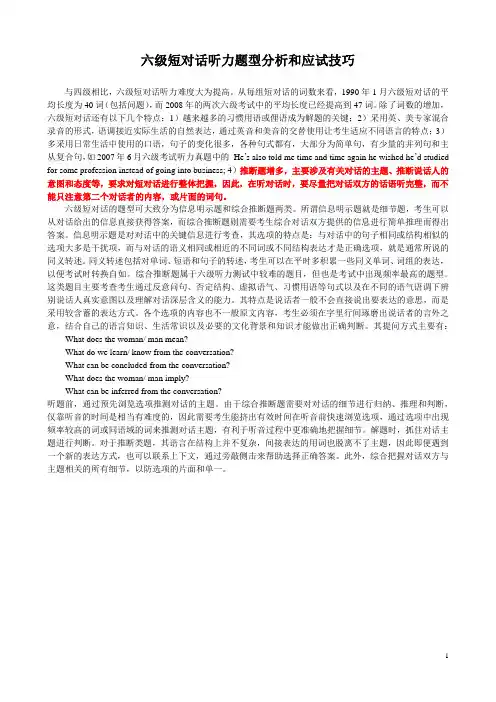
六级短对话听力题型分析和应试技巧与四级相比,六级短对话听力难度大为提高。
从每组短对话的词数来看,1990年1月六级短对话的平均长度为40词(包括问题),而2008年的两次六级考试中的平均长度已经提高到47词。
除了词数的增加,六级短对话还有以下几个特点:1)越来越多的习惯用语或俚语成为解题的关键;2)采用英、美专家混合录音的形式,语调接近实际生活的自然表达,通过英音和美音的交替使用让考生适应不同语言的特点;3)多采用日常生活中使用的口语,句子的变化很多,各种句式都有,大部分为简单句,有少量的并列句和主从复合句,如2007年6月六级考试听力真题中的He’s also told me time and time again he wished he’d studied for some profession instead of going into business; 4)推断题增多,主要涉及有关对话的主题、推断说话人的意图和态度等,要求对短对话进行整体把握,因此,在听对话时,要尽量把对话双方的话语听完整,而不能只注意第二个对话者的内容,或片面的词句。
六级短对话的题型可大致分为信息明示题和综合推断题两类。
所谓信息明示题就是细节题,考生可以从对话给出的信息直接获得答案,而综合推断题则需要考生综合对话双方提供的信息进行简单推理而得出答案。
信息明示题是对对话中的关键信息进行考查,其选项的特点是:与对话中的句子相同或结构相似的选项大多是干扰项,而与对话的语义相同或相近的不同词或不同结构表达才是正确选项,就是通常所说的同义转述。
同义转述包括对单词、短语和句子的转述,考生可以在平时多积累一些同义单词、词组的表达,以便考试时转换自如。
综合推断题属于六级听力测试中较难的题目,但也是考试中出现频率最高的题型。
这类题目主要考查考生通过反意问句、否定结构、虚拟语气、习惯用语等句式以及在不同的语气语调下辨别说话人真实意图以及理解对话深层含义的能力。
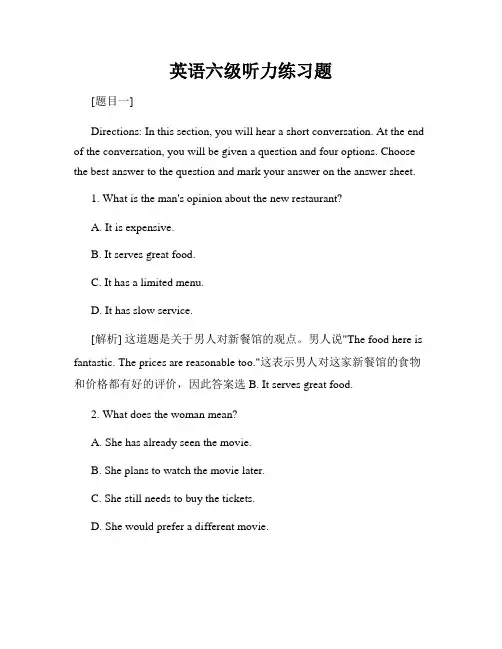
英语六级听力练习题[题目一]Directions: In this section, you will hear a short conversation. At the end of the conversation, you will be given a question and four options. Choose the best answer to the question and mark your answer on the answer sheet.1. What is the man's opinion about the new restaurant?A. It is expensive.B. It serves great food.C. It has a limited menu.D. It has slow service.[解析] 这道题是关于男人对新餐馆的观点。
男人说"The food here is fantastic. The prices are reasonable too."这表示男人对这家新餐馆的食物和价格都有好的评价,因此答案选B. It serves great food.2. What does the woman mean?A. She has already seen the movie.B. She plans to watch the movie later.C. She still needs to buy the tickets.D. She would prefer a different movie.[解析] 这道题是关于女人的意思。
女人说"I'm going to see the new movie this weekend."这表示周末她打算去看电影,因此答案选B. She plans to watch the movie later.[题目二]Directions: In this section, you will hear a short talk. After the talk, you will be given six questions. Choose the best answer to each question and mark your answer on the answer sheet.3. What is the talk mainly about?A. The history of jazz music.B. Different types of jazz instruments.C. Famous jazz musicians.D. The impact of jazz in America.[解析] 这道题是关于短篇讲话的主要内容。
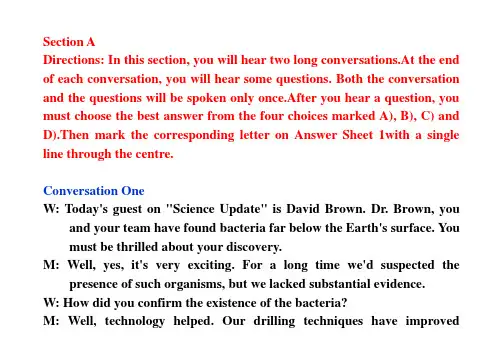
Section ADirections: In this section, you will hear two long conversations.At the end of each conversation, you will hear some questions. Both the conversation and the questions will be spoken only once.After you hear a question, you must choose the best answer from the four choices marked A), B), C) and D).Then mark the corresponding letter on Answer Sheet 1with a single line through the centre.Conversation OneW: Today's guest on "Science Update" is David Brown. Dr. Brown, you and your team have found bacteria far below the Earth's surface. You must be thrilled about your discovery.M: Well, yes, it's very exciting. For a long time we'd suspected the presence of such organisms, but we lacked substantial evidence.W: How did you confirm the existence of the bacteria?M: Well, technology helped. Our drilling techniques have improvedsignificantly, and so the risk that surface bacteria could be mistaken for those found at much greater depth was reduced. With the new techniques, we could get much deeper into the Earth.W: How far down did you actually get?M: In one case, about three kilometers. We were surprised, I must tell you, that there were organisms that far down.W: You know, it sounds like fiction, something like a lost world.M: Let's call it a hidden biosphere, and it's probably a very extensive one.The mass of the living organisms below the surface may be equal in size to the mass of the surface bacteria.W: Have you found any unique life-forms?M: Yes. We've found a very special organism. Let's call it Type-A bacterium. It can live and grow only where there is no oxygen.W: Is there any danger of these bacteria infecting people when you bring them to the surface?M: These bacteria were adapted to an environment that's completely different from humans'. That's to say, they could not survive in ourenvironment. So we really don't need to worry about these bacteria causing illness in people.Questions 1 to 4 are based on the conversation you have just heard.1. What have Dr. Brown and his team discovered?2. What helps to confirm the existence of bacteria below the Earth'ssurface?3. How deep down did the man find the bacteria?4. Why does the man say there is no danger of infection by the bacteriabrought to surface?Conversation TwoW: I haven't seen you here for a couple weeks. Have you stopped eating or something?M: No. Does it look like I've stopped eating? I've been spending a lot of time in the library.W: Working on a paper?M: I wish I was working on a paper! I'm working on three differentpapers:anthropology, English literature, and history.W: Wow, that is a lot of work.M: Yeah, and what's frustrating is that I'm studying the nineteenth century British Empire in all three classes, but I can't just write a single paper for all three.W: Why not?M: The professors won't let me even if I make it three times as long as the suggested length.W: That's too bad. Could you write your papers on three aspects of one topic?M: Hmm. What do you mean? Do you have something in mind?W: Well, let's see. Hmm...Maybe you could do something with Romanticism, like, oh... write your anthropology paper on the cultural basis of Romanticism, and, uh, your history paper on the influence of the Romantic poets on British foreign policy, and, OK, and your English paper on an analysis of some Romantic poems.M: Hey, that's not a bad idea! I've already started the research for one ofthe papers, so I can use that. What can I do to repay you?W: You want to write up my chemistry paper for me?M: I'd love to, but I've never taken chemistry, so I'm not sure you'd like the results.W: Oh well, no thanks necessary then. I'll do it myself. Have a good weekend, and try to get out of the library and get some sleep. You have big circles under your eyes.M: OK, I'll try. See you later.Questions 5 to 8 are based on the conversation you have just heard.5. What has the man been busy doing recently?6. What does the woman suggest the man do to make his work easier?7. Why does the woman mention Romanticism?8. Why doesn't the man want to help the woman?Section BDirections: In this section, you will hear two passages.At the end of each passage, you will hear some questions.Both the passage and the questionswill be spoken only once.After you hear a question, you must choose the best answerfrom the four choices marked A), B), C) and D).Then mark the corresponding letter on Answer Sheet 1with a single line through the centre.Passage OneI hope you have all finished reading the assigned chapter on insurance-so that you're prepared for our discussion today. But, before we start, I'd like to mention a few things your text doesn't go into.It's interesting to note that insurance has existed in some form for a very long time. The earliest insurance policies provided shipping protection for merchants as far back as 3000 B. C.In general, the contracts were often no more than verbal agreements. They granted loans to merchants with the understanding that if a particular shipment of goods was lost at sea, the loan didn't have to be repaid. Interest on the loans varied according to how risky it was to transport the goods. During periods of heavy piracy at sea, for example,the amount of interest and the cost of the policy went up considerably. So, you can see how insurance helped encourage international trade. Even the most cautious merchants became willing to risk shipping their goods over long distances-not to mention in hazardous weather conditions-when they had this kind of protection available.Generally speaking, the basic form of an insurance policy has been pretty much the same since the Middle Ages. There are four points that were prominent then and remain dominant in all policies today. These were outlined in chapter six and will serve as the basis for the rest of today's discussion.Questions 9 to 11 are based on the passage you have just heard.9. Who were the first insurance contracts designed to protect?10. What determined the interest on the loans?11. What does the speaker say about current insurance policies?Passage TwoMilk was a basic food of man long before history was written. It will probably keep on being one as long as there are animals that give milk.Many ancient people thought that milk had great healing power. One of the most famous Greek doctors told his patients to drink milk to cure illness.For more than two hundred years most people got their milk from their own cattle or from a nearby dairy herd. But in time new inventions made the dairy industry a big business. In 1851 Gail Borden, founder of a milk company, found a way to take some of the water out of milk. This made it keep much longer. Four years later, Louis Pasteur introduced the pasteurization process. This process killed the bacteria in milk that caused it to spoil. Next, a special milk bottle was designed. This was followed by the invention of machines that could fill bottles and cap them automatically. These discoveries had a great effect on the dairy industry. They meant that milk could be stored longer. It could be safely shipped over long distances. Preparing and distributing milk soon became a large-scale business. Recently, in a single year more than sixty billionquarts of milk were sold in the United States.Some people believe that milk drinking will become less popular in America than it has been. But remember how long milk has been a basic food and think of the many ways in which it is useful. It seems safe to say that the milk industry will always be important.Questions 12 to 15 are based on the passage you have just heard.12. What did ancient people think about milk?13. Why did milk become a big business?14. What invention made milk keep longer in 1851?15. What does the speaker think of the milk industry in the future?Section CDirections: In this section,you will hear recordings of lectures or talksfollowed by some questions.The recordings will be played only once.After you hear a question,you must choose the best answerfrom the four choices marked A), B), C) and D).Then mark the corresponding letteron Answer Sheet 1with a single line through the centre.Now listen to the following recording and answer questions 16 to 19.Fifty years ago, when I began exploring the ocean, no one imagined that we could do anything to harm the ocean by what we put into it or by what we took out of it. It seemed, at that time, to be a sea of paradise, but now we know that we are facing paradise lost.I want to share with you my personal view of changes in the sea that affect all of us, and to consider why it matters that in 50 years, we've lost---actually, we've taken, we've eaten---more than 90 percent of the big fish in the sea; why you should care that nearly half of the coral reefs have disappeared; why a reduction of oxygen in large areas of the Pacific should concern not only the creatures that are dying, but it really should concern you. It does concern you, as well.There was still time. Well, now is that time. I hope for your help to explore and protect the wild ocean in ways that will restore the health and, in so doing, secure hope for humankind. Health to the ocean means healthfor us.For me, as a scientist, it all began in 1953when I first tried underwater breathing device. It's when I first got to know how fish swimming in mysterious ocean. I actually love diving at night; you see a lot of fish then that you don't see in the daytime. Since then, I've started designing and building 13 underwater systems to access the deep sea. I led a five-year National Geographic expedition, the Sustainable Seas expeditions, using these little submarines. They're so simple to drive that even a scientist can do it. And I'm living proof.Over time, most of the planet's organic carbon has been absorbed and stored there. The ocean drives climate and weather, stabilizes temperature, shapes Earth's chemistry. Water from the sea provides home for about 97 percent of life in the world, maybe in the universe. No water, no life; no blue, no green.A global plan of action with a world conservation union is underway to protect biodiversity, to recover from the impacts of climate change. New technologies are needed to map, photograph and explore the 95 percent ofthe ocean that we have yet to see. I wish you would use all means at your disposal---films, expeditions, the web, new submarines---and campaign to arouse public support for a global network of marine protected areas---hope spots large enough to save and restore the ocean, the blue heart of the planet.16. What was beyond imagination when the speaker began to explore the ocean 50 years ago?17. What should we worry about in the Pacific except for the dying creatures?18. How long has the National Geographic expedition led by the speaker lasted?19. What is the purpose for the global plan of action?Now listen to the following recording and answer questions 20 to 22.Financially speaking, makeup can be a burden. By one estimate, a woman in the US will spend an average of $15,000 on makeup in herlifetime. The fact is that the ingredients in these products often account for no more than 15% of the cost, according to Randy Schueller, a cosmetic chemist who has been in the beauty business for more than 30 years.What people are mainly paying for is marketing, packaging, and brands. That's why lipstick, for example, which is mostly wax, oil, and pigments, routinely costs more than $20 a tube at a department store makeup counter.Schueller says that, because ingredients are such a small share of the cost, "price does not really relate to quality when it comes to cosmetic products."In fact, packaging has become such a focus in the industry that there are actually awards given out for it.Where the makeup is sold matters, too. It's a form of marketing in itself, which is evident when you consider the difference between upscale brands carried at retailers such as Sephora and Ulta and mass-market brands sold at drugstores.Karen Grant, the global beauty industry analyst at research firm NPD, says they're two different models, and consumers pay for that difference. At higher-end stores, you "pay for the display areas and the people who are helping to sell the product, whereas in a mass environment it can be sealed up behind a package and sit on a shelf," she says. High-end shops also often make tester items available, and may accept returns even on used items. It simply costs a retailer more to be profitable in that environment, and those costs are factored into the price tags on the products.There's evidence that consumers are buying into famous brands at increasing rates. Sales in the global cosmetics market are rising-to $56.9 billion last year, according to Euromonitor and are expected to keep growing. But it's not because the price of makeup is getting more expensive. In fact, it hasn't.What should a consumer do? Know what you're looking for. If you want a lipstick that will last, then go with one designed for that. But don't assume that more expensive means better. More than anything else, whatthe price of makeup simply reflects is the price that you're willing to pay for it.20. What do we learn about Randy Schueller according to the speaker?21. What is Randy Schueller's conclusion about ingredients as a small share of the cost?22. What is the evident of more and more consumers buying into famous brands?Now listen to the following recording and answer questions 23 to 25.Mountain of Light, one of the world's best-known diamonds, is on the Queen Elizabeth's crown. But the Indians want it back. A group of Indian stars and businessmen has united to instruct lawyers to begin legal proceedings in London's High Court to return the Mountain of Light diamond. The group says that the 105-carat diamond worth a reported £100m was stolen from its true home in India and they are demanding that the UK Government returns it.The diamond was in the crown worn by the Queen Elizabeth at hercrowning ceremony in 1953.Bollywood star Bhumicka Singh, also part of the group, said: "The Mountain of Light is not just a 105-carat stone, but part of our history and culture and should undoubtedly be returned."British Lawyers instructed by the "Mountain of Light" group to return the stone, said they would base their case on the Return of Cultural Objects Act, which gives national institutions in the UK the power to return stolen art.Satish Jakhu, of Birmingham-based law firm Rubric Lois King, said they would make their claim under the common law doctrine of "trespass to goods", arguing that the government had stolen the diamond. He added that they would be taking their case to the International Court of Justice.Historian Andrew Roberts told the Mail on Sunday:"Those involved in this ridiculous case should recognize that the British Crown Jewels is precisely the right place for the Mountain of Light diamond to reside, in grateful recognition for over three centuries of British involvement in India, which led to the modernization, development, protection, agrarianadvance, linguistic unification and ultimately the democratization of the sub-continent."According to legend, the gem can only be worn by God or women, and whoever wears the jewel will become extremely powerful, but if a man wears it, he will meet an unfortunate end.The UK Government has so far rejected the claims.23. What do the Indian stars and businessmen want to do?24. What is the use of the Return of Cultural Objects Act?25. What will a man become if he wears the diamond according to the legend?。
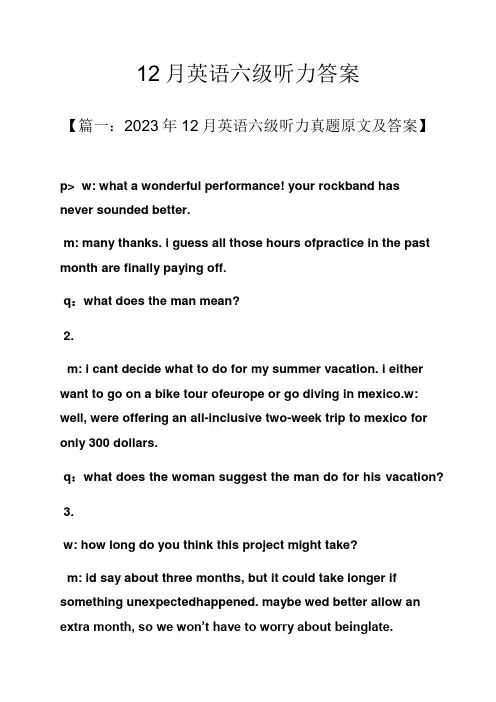
12月英语六级听力答案【篇一:2023年12月英语六级听力真题原文及答案】p> w: what a wonderful performance! your rockband hasnever sounded better.m: many thanks. i guess all those hours ofpractice in the past month are finally paying off.q:what does the man mean?2.m: i cant decide what to do for my summer vacation. i either want to go on a bike tour ofeurope or go diving in mexico.w: well, were offering an all-inclusive two-week trip to mexico for only 300 dollars.q:what does the woman suggest the man do for his vacation?3.w: how long do you think this project might take?m: id say about three months, but it could take longer if something unexpectedhappened. maybe wed better allow an extra month, so we won’t have to worry about beinglate.q: why does the man say extra time should be allowed for the project?4.m: im thinking about becoming a member here, and id like some information.w: sure. a three-month membership costs 150 dollars, and that includes use of the wait-room, sauna and pool. ill give you a free path so that you can try out the facilities before youdecide.q: what do we learn from the conversation?5.w: im sorry to hear that you failed the physics course, ted.m: lets face it. im just not cut out to be a scientist.q: what does the man mean?6.m: gary insisted on buying the food for the picnic.w: thats pretty generous of him. but shouldnt we at least offer to share the expenses?he has a big family to support.q: what does the woman suggest they do?7.w: did you see the headlines in the paper this morning?m: year. apparently the bus company will be laying off its employees if they cant reach anagreement on wages by midnight.q: what did the man read about?8.w: have we received payment for the overseas order we delivered last month?m: yes. the cheque came in yesterday afternoon. ill be depositing it when i go the banktoday.q: what is the woman concerned about?w: ok, thats it. now we have to make adecision. we might as well do that now, dont youthink?m: sure, lets see. first we saw frank brisenski.what did you think of him?w: well, hes certainly a very polite young man. m: and very relaxed, too.w: but his appearance…m: en… he wasnt well dressed. he wasnt even wearing a tie. w: but he did have a nice voice. he sounded good on the telephone.m: true. and i thought he seemed very intelligent. he answered donas questions verywell.m: en… she did look very neat, very nicely dressed, but…w: but so shy. she wouldnt be very good at talking to peopleat the front desk.m: en…ok. now who was the next? ar…yes, david wallace. i thought he was very good,had a lot of potential. what do you think?w: en… he seemed like a very bright guy. he d ressed very nicely, too. and he had a reallynice appearance.m: he seemed relaxed to me, the type of person people feel comfortable with right away.w: he was polite, but also very friendly and relaxed as you say.i think hell be good withthe guests at the front desk.m: he had a very pleasant voice, too.w: thats right. ok, good! i guess we have our receptionist then, dont you?m: yes, i think so. well just offer the job to…question 9: what are the speakers looking for?question 10: what is frank brisenskis weakness?question 11: what do the speakers decide to do?【六级听力长对话原文2】w: hello.m: hello. is that the reference library?w: yes, can i help you?m: i hope so. i ran earlier and asked for some information about dennis hutton, thescientist. you asked me to ring back. w: oh, yes. i have found something.m: good. ive got a pencil and paper. perhaps you could read out what it says.w: certainly. hutton dennis, born darlington, 1836, died new york, 1920.m: yes, got that.w: inventer and physicist, the son of a farmworker. he was admitted to the university oflondon at the age of 15.m: yes.w: he graduated at 17 with the first class degree in physics and mathematics. all right?m: yes, all right.w: he made his first notable achievement at the age of 18. it was a method ofrefrigeration which rolls from his work in lowtemperature physics. he became professor ofmathematics at the university of manchester at 24, where he remained for twelve years. duringthat time, he married one of his students, natasha willoughbym: yes, go on.w: later working together in london, they laid the foundations of modern physics byshowing that normal laws of cause and effect do not apply at the level of subatomic particles.for thishe and his wife received the nobel prize for physics in 1910, and did so again in 1912for their work on very high frequency radio waves. in his lifetime, hutton patented 244inventions. do you want any more?m: yes, when did he go to america?w: let me see. in 1920 he went to teach in new york and died there suddenly after onlythree weeks. still he was a good age.m: yes, i suppose so. well, thanks.question 12: what do we learn about dennis hutton when he was 15?question 13: what did dennis hutton do at the age of 24? question 14: for what were dennis hutton and his wife awarded the nobel prize a secondtime?question 15: why did dennis hutton go to new york?in america, white tailed deer are morenumerous than ever before, so abundant in factthat theyve become a suburban nuisance and ahealth hazard.why cant the herd be thinned the old-fashionedway? the small community of north haven on longisland is home to some six hundred to sevenhundred deer. the department of environmental conservation estimates the optimumpopulation at 60. the town has been browsed bare of vegetation except where gardens andshrubs are protected by high fences.drivers routinely collide with deer and there are so many dead bodies left by the side of theroad that the town has made it a deal with a local pet cemetery to collect and dispose of thebodies. some people in the town have become ill from deer transmitted diseases. on theoccasions when hunting has been tried, local animal rights people have worked to secure courtorders against the hunts. and when that is failed, they stop the hunters, banging on pots andpans to alert the deer. town meetings called to discuss the problem inevitably dissolved intoconfrontations.the activists believe simply that the deer are not the problem. some communities have evendiscussed the possibility of bringing wolves back into the ecological mix. that means wolves inthe suburbs of new york. it is almost too wonderfulnot to try it. the wolves would kill deer ofcourse. they would also terrorize and kill dogs and cats which is not what the suburbandwellers have in mind.questions 16 to 18 are based on the passage you have just heardq16. what do we learn about white-tailed deer in north haven?q17. why do local animal rights people bang on pots and pans?q18. what would happen if wolves were brought back into the ecological mix?六级短文2原文and now, if youll walk this way, ladies and gentlemen, the next room were going to see isthe room in which the family used to hold their formal dinner parties and even occasionallyentertain heads of state and royalty. however, they managed to keep this room friendly andintimate. and i think youll agree. it has a very informal atmosphere, quite unlike some grandhouses you visit. the curtains were never drawn, even at night, so guests got a view of the lakeand fountains outside which were lit up at night – a very attractive sight. as you can see,ladies and gentlemen, the guests were seated very informally around this oval table, whichwould add to the relaxed atmosphere. the table dates from the 18th century andis made fromspanish oak. its rather remarkable for the fact that although its extremely big, itssupported by just six rather slim legs. however, it seems to have survived like that for 200years. so its probably going to last a bit longer. the chairs which go with the table are not acomplete set. there were originally six of them. they are interesting for the fact that they arevery plain and undecorated for the time, with only one plain central panel at the back and noarmrests. i myself find them rather uncomfortable to sit in for very long, but people wereused to more discomfort in the past. and now, ladies and gentlemen, if youd like to follow mein to the great hall…q19. what do we learn about the speaker?q20. what does the speaker say about the room they are visiting?【篇二:2023年12月英语六级听力原文】语六级听力原文。
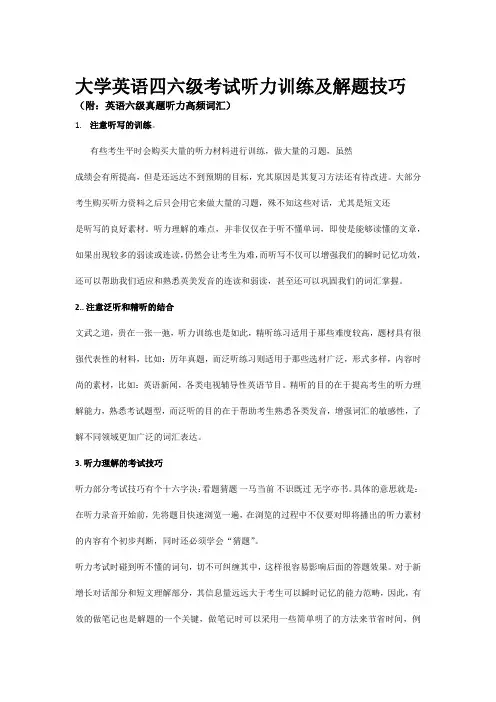
大学英语四六级考试听力训练及解题技巧(附:英语六级真题听力高频词汇)1.注意听写的训练。
有些考生平时会购买大量的听力材料进行训练,做大量的习题,虽然成绩会有所提高,但是还远达不到预期的目标,究其原因是其复习方法还有待改进。
大部分考生购买听力资料之后只会用它来做大量的习题,殊不知这些对话,尤其是短文还是听写的良好素材。
听力理解的难点,并非仅仅在于听不懂单词,即使是能够读懂的文章,如果出现较多的弱读或连读,仍然会让考生为难,而听写不仅可以增强我们的瞬时记忆功效,还可以帮助我们适应和熟悉英美发音的连读和弱读,甚至还可以巩固我们的词汇掌握。
2.. 注意泛听和精听的结合文武之道,贵在一张一弛,听力训练也是如此,精听练习适用于那些难度较高,题材具有很强代表性的材料,比如:历年真题,而泛听练习则适用于那些选材广泛,形式多样,内容时尚的素材,比如:英语新闻,各类电视辅导性英语节目。
精听的目的在于提高考生的听力理解能力,熟悉考试题型,而泛听的目的在于帮助考生熟悉各类发音,增强词汇的敏感性,了解不同领域更加广泛的词汇表达。
3. 听力理解的考试技巧听力部分考试技巧有个十六字决:看题猜题一马当前不识既过无字亦书。
具体的意思就是:在听力录音开始前,先将题目快速浏览一遍,在浏览的过程中不仅要对即将播出的听力素材的内容有个初步判断,同时还必须学会“猜题”。
听力考试时碰到听不懂的词句,切不可纠缠其中,这样很容易影响后面的答题效果。
对于新增长对话部分和短文理解部分,其信息量远远大于考生可以瞬时记忆的能力范畴,因此,有效的做笔记也是解题的一个关键,做笔记时可以采用一些简单明了的方法来节省时间,例如:∵ because ∴ therefore √ true/correct × wrong/false ? not sure/question或者采用单词的几个字母缩写来代表整个单词。
另外要听清楚提问问题所在,考生在浏览选项进行推测判断时切不可忽略听力中所提的问题,免得虽听懂了原文的内容,却因没有注意细节内容,仍选择错误。
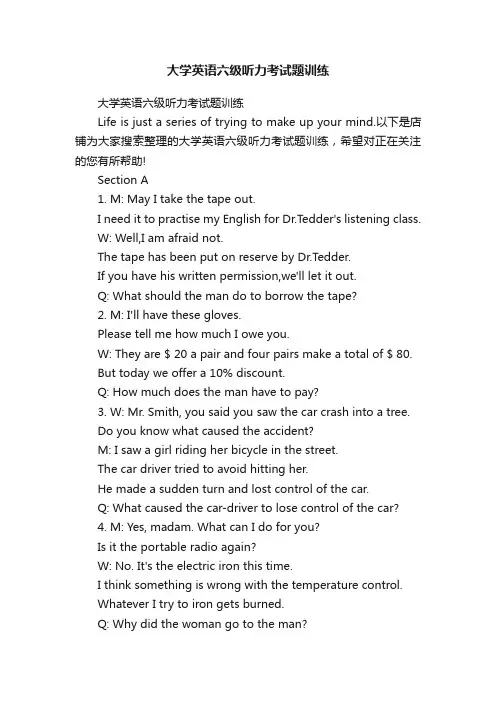
大学英语六级听力考试题训练大学英语六级听力考试题训练Life is just a series of trying to make up your mind.以下是店铺为大家搜索整理的大学英语六级听力考试题训练,希望对正在关注的您有所帮助!Section A1. M: May I take the tape out.I need it to practise my English for Dr.Tedder's listening class.W: Well,I am afraid not.The tape has been put on reserve by Dr.Tedder.If you have his written permission,we'll let it out.Q: What should the man do to borrow the tape?2. M: I'll have these gloves.Please tell me how much I owe you.W: They are $ 20 a pair and four pairs make a total of $ 80.But today we offer a 10% discount.Q: How much does the man have to pay?3. W: Mr. Smith, you said you saw the car crash into a tree.Do you know what caused the accident?M: I saw a girl riding her bicycle in the street.The car driver tried to avoid hitting her.He made a sudden turn and lost control of the car.Q: What caused the car-driver to lose control of the car?4. M: Yes, madam. What can I do for you?Is it the portable radio again?W: No. It's the electric iron this time.I think something is wrong with the temperature control.Whatever I try to iron gets burned.Q: Why did the woman go to the man?5. M: Isn't that a new brand of computer you are working at?W: Oh, Henry. This is the third time you've asked me about it.Q: What does the woman imply?6. W:Do you know Bill works as a car-washer at a hotel by the river?M: It isn't a bad job to start wite.I wouldn't mind that job for the summer if no others are available.Q: What does the man mean?7. M:What a wonderful game it was?I hope you enjoyed it as much as I did.W:I must admit that I felt sleepy during the two hours.Q:How did the woman feel about the game?8.M:Hi,Mary.I just came back from Pairs yesterday.Anything new when I was away?W: Congratulations, Tom.It's told you'll be promoted to manager and become my immediate boss.What is most probably the relationship between the two speakers at the moment?9. W: What a poor memory I have!I did write down the address on a slip of paper when I answered the phone a moment ago.But now the paper has disappeared without any trace.M: Don't worry.I'll be seeing the teacher in an hour.Q: What do we learn from this conversation?10. M:Of the two ways for us to go to Washington,which one do you prefer?by train or by air?W: By air. It seems very expensivebut as a whole it will save us plenty of time on the way.Q: What does the woman say about the reason for her choice?Section BPassage OneThe Republican Party is one of the two main political parties of the USAIt was formed in 1854 by groups opposed to slavery.Lincoln became the first Republican president in 1861and republicans held the presidency from then until 1913except for two terms.They returned to power from 1921--1933but were blamed for the economic crisis of 1929 and the poverty and unemployment that follower.The Party did not win back the presidency until Eisenhower was elected in 1952.The next Republican president was Richard Nixon, elected in 1968.During Nixon's presidencyas during most of Eisenhower'the Republicans failed to win a majority in Congress.The Republican party tends to be more conservative than the Democratic partyit is associated with free enterprise in the economyand is most strongly supported in the rural and suburban areas of the Norththe Middle West and the West.11. What is the passage mainly about?12. Which of the following is not true?13. What can we infer from the passage?Passage TwoThe classic case in medical history of a typhoid carrier is that of Mary MallorDuring a New York typhoid epidemic she was found working as a cookand thus very readily spread the disease to otherShe persisted in finding employment as a cook both in private service and in various institutionShe even changed her name to avoid detection.For eight years she continued to carry and spread typhoid wherever she went.Finally she was made to live in a hospital.There her work could be regulated so that she did not pass on typhoid.She lived in hospital for twenty-three years.until her death in 1938.For thirty-one years she had been a known carrier of the diseasewithout herself suffering any ill effects.14. What was Mary Mallon according to the case?15. What is implied in the passage?16. Which of the following is not true?Passage ThreeLondon is a city sitting on a meandering riverwith palaces overlooking barges sailing on the clear water of the Thames.Each year the Cambridge and Oxford boat race is run on the river.Such a boat has eight oarsmen, each using an oar of 3.7 metres.A trained crew can work up great speed and shoot away like a rocked.The victor of the race is front-page news of the evening paper.Many bridges span the Thames in London.Of they the most famous is probably the Westminster Bridge.If you happen to be in London one of these days.do take a look from that bridge.On your right you will see the house of Commons and the House of Lord.and the Big Ben, which strikes every quarter of the hour.In the busy traffic on the bridgeyou will notice the red double-decker buseswhich roll past quite smoothly in spite of their huge bodies.Two bridges, the Waterloo Bridge and the London Bridge are visible in the distance.Fifty years ago London suffered from smoke and fobLondoners called it pea-soup fobbecause it looked so thick.Today the smog•is gone.and the air remains clearand fish has returned to the Thamesthanks to the Clean Air Act and other measures.17. What river is London sitting on?18. Which of the following is not mentioned in the passage?19. According to the passage, which of the following is not true?20. What legislation helps clean the air。
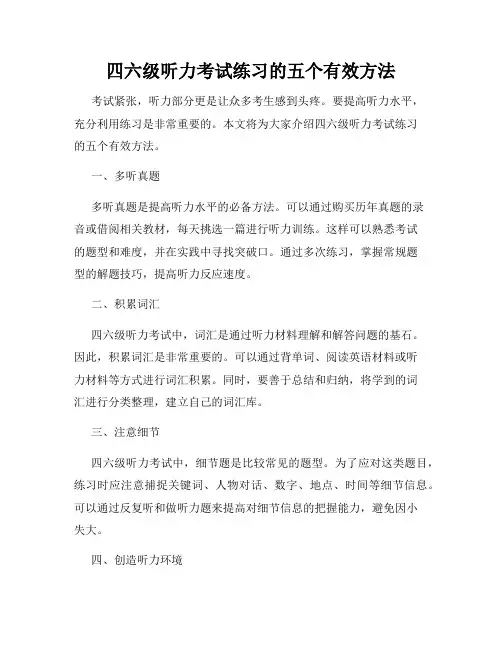
四六级听力考试练习的五个有效方法考试紧张,听力部分更是让众多考生感到头疼。
要提高听力水平,充分利用练习是非常重要的。
本文将为大家介绍四六级听力考试练习的五个有效方法。
一、多听真题多听真题是提高听力水平的必备方法。
可以通过购买历年真题的录音或借阅相关教材,每天挑选一篇进行听力训练。
这样可以熟悉考试的题型和难度,并在实践中寻找突破口。
通过多次练习,掌握常规题型的解题技巧,提高听力反应速度。
二、积累词汇四六级听力考试中,词汇是通过听力材料理解和解答问题的基石。
因此,积累词汇是非常重要的。
可以通过背单词、阅读英语材料或听力材料等方式进行词汇积累。
同时,要善于总结和归纳,将学到的词汇进行分类整理,建立自己的词汇库。
三、注意细节四六级听力考试中,细节题是比较常见的题型。
为了应对这类题目,练习时应注意捕捉关键词、人物对话、数字、地点、时间等细节信息。
可以通过反复听和做听力题来提高对细节信息的把握能力,避免因小失大。
四、创造听力环境营造良好的听力环境是提高听力水平的重要手段。
可以通过听英语广播、音乐、跟读、看英语电影等方式来提升对英语语音的敏感度。
此外,参加英语角、找外教交流等活动也可以增加听力的实践机会,加深对各种语速和口音的理解。
五、练习笔记整理听力考试过程中,良好的记录和整理习惯是必不可少的。
可以在听力过程中做简略的笔记,把重要信息记录下来,以便后续解答问题。
同时,听完录音后,要及时整理笔记,将听到的内容整合成逻辑完整的句子或段落。
这样可以提高听力的记忆度和理解度。
综上所述,通过多听真题、积累词汇、注意细节、创造听力环境和练习笔记整理等五个方法,可以有效提高四六级听力考试的能力。
在备考期间,要持之以恒,坚持每天练习,不断完善听力技巧和策略,相信在考试中取得好成绩不再是难事。
希望以上方法能对大家的备考有所帮助,祝愿大家取得优异成绩!。
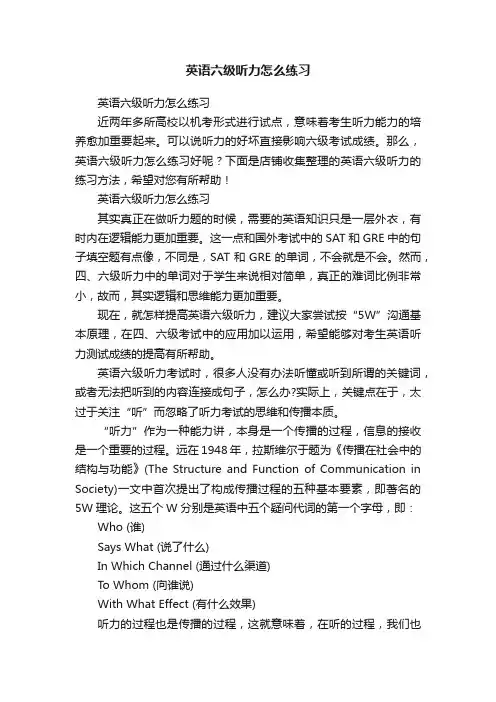
英语六级听力怎么练习英语六级听力怎么练习近两年多所高校以机考形式进行试点,意味着考生听力能力的培养愈加重要起来。
可以说听力的好坏直接影响六级考试成绩。
那么,英语六级听力怎么练习好呢?下面是店铺收集整理的英语六级听力的练习方法,希望对您有所帮助!英语六级听力怎么练习其实真正在做听力题的时候,需要的英语知识只是一层外衣,有时内在逻辑能力更加重要。
这一点和国外考试中的SAT和GRE中的句子填空题有点像,不同是,SAT和GRE的单词,不会就是不会。
然而,四、六级听力中的单词对于学生来说相对简单,真正的难词比例非常小,故而,其实逻辑和思维能力更加重要。
现在,就怎样提高英语六级听力,建议大家尝试按“5W”沟通基本原理,在四、六级考试中的应用加以运用,希望能够对考生英语听力测试成绩的提高有所帮助。
英语六级听力考试时,很多人没有办法听懂或听到所谓的关键词,或者无法把听到的内容连接成句子,怎么办?实际上,关键点在于,太过于关注“听”而忽略了听力考试的思维和传播本质。
“听力”作为一种能力讲,本身是一个传播的过程,信息的接收是一个重要的过程。
远在1948年,拉斯维尔于题为《传播在社会中的结构与功能》(The Structure and Function of Communication in Society)一文中首次提出了构成传播过程的五种基本要素,即著名的5W理论。
这五个W分别是英语中五个疑问代词的第一个字母,即:Who (谁)Says What (说了什么)In Which Channel (通过什么渠道)To Whom (向谁说)With What Effect (有什么效果)听力的过程也是传播的过程,这就意味着,在听的过程,我们也需要这样的“思维经历”。
实际上,在听的过程完全可以遵循这个脉络,从who入手,说话人中,重要的说话信息一般在第二说话人中,他说了什么,是我们做题的重点,即所谓的关键词。
通过的途径一般有两种,conversation与paragraph,to whom 就是我们自己,而效果的考核就是我们题目。
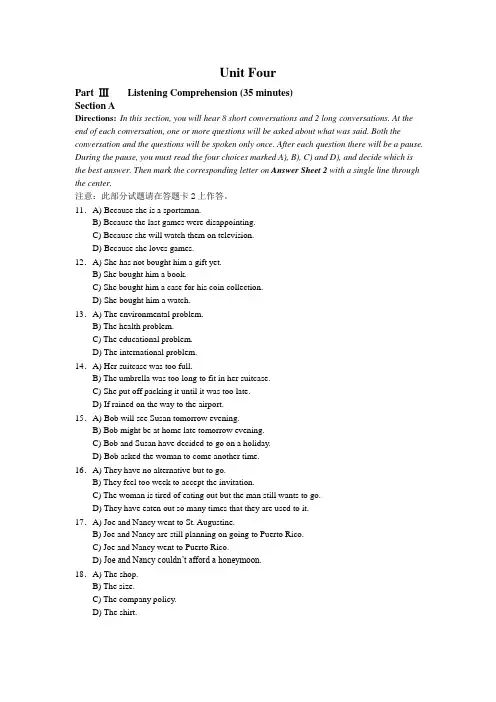
Unit FourPart ⅢListening Comprehension (35 minutes)Section ADirections:In this section, you will hear 8 short conversations and 2 long conversations. At the end of each conversation, one or more questions will be asked about what was said. Both the conversation and the questions will be spoken only once. After each question there will be a pause. During the pause, you must read the four choices marked A), B), C) and D), and decide which is the best answer. Then mark the corresponding letter on Answer Sheet 2 with a single line through the center.注意:此部分试题请在答题卡2上作答。
11.A) Because she is a sportsman.B) Because the last games were disappointing.C) Because she will watch them on television.D) Because she loves games.12.A) She has not bought him a gift yet.B) She bought him a book.C) She bought him a case for his coin collection.D) She bought him a watch.13.A) The environmental problem.B) The health problem.C) The educational problem.D) The international problem.14.A) Her suitcase was too full.B) The umbrella was too long to fit in her suitcase.C) She put off packing it until it was too late.D) If rained on the way to the airport.15.A) Bob will see Susan tomorrow evening.B) Bob might be at home late tomorrow evening.C) Bob and Susan have decided to go on a holiday.D) Bob asked the woman to come another time.16.A) They have no alternative but to go.B) They feel too week to accept the invitation.C) The woman is tired of eating out but the man still wants to go.D) They have eaten out so many times that they are used to it.17.A) Joe and Nancy went to St. Augustine.B) Joe and Nancy are still planning on going to Puerto Rico.C) Joe and Nancy went to Puerto Rico.D) Joe and Nancy couldn’t afford a honeymoon.18.A) The shop.B) The size.C) The company policy.D) The shirt.Questions 19 to 22 are based on the conversation you have just heard.19. A) The benefits of strong business competition.B) A proposal to lower the cost of production.C) Complaints about the expense of modernization.D) Suggestions concerning new business strategies.20. A) It cost much more than its worth.B) It should be brought up-to-date.C) It calls for immediate repairs.D) It can still be used for a long time.21. A) The personnel manager should be fired for inefficiency.B) A few engineers should be employed to modernize the factory.C) The entire staff should be retrained.D) Better-educated employees should be promoted.22. A) Their competitors have long been advertising on TV.B) TV commercials are less expensive.C) Advertising in newspapers alone is not sufficient.D) TV commercials attract more investments.Questions 23 to 25 are based on the conversation you have just heard.23.A) To be confident in stating their views.B) To disregard other people’s views.C) To disregard their own achievements.D) To be selfish and greedy.24.A) Because they can be turned off by body odour.B) Because they are taller and stronger.C) Because they are slow in becoming intimate.D) Because they believe the relationship is not intimate enough.25.A) They are suspicious of it.B) They are afraid of itC) They are fine with itD) They are disrespectful about itSection BDirections: In this section, you will hear 3 short passages. At the end of each passage, you will hear some questions. Both the passage and the questions will be spoken only once.After you hear a question, you must choose the best answer from the four choicesmarked A), B), C) and D). Then mark the corresponding letter on the Answer Sheet 2with a single line through the center.注意:此部分试题请在答题卡2上作答。
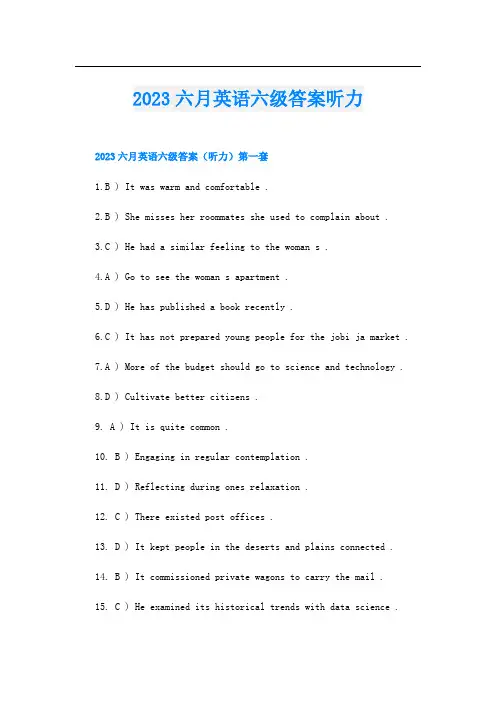
2023六月英语六级答案听力2023六月英语六级答案(听力)第一套1.B ) It was warm and comfortable .2.B ) She misses her roommates she used to complain about .3.C ) He had a similar feeling to the woman s .4.A ) Go to see the woman s apartment .5.D ) He has published a book recently .6.C ) It has not prepared young people for the jobi ja market .7.A ) More of the budget should go to science and technology .8.D ) Cultivate better citizens .9. A ) It is quite common .10. B ) Engaging in regular contemplation .11. D ) Reflecting during ones relaxation .12. C ) There existed post offices .13. D ) It kept people in the deserts and plains connected .14. B ) It commissioned private wagons to carry the mail .15. C ) He examined its historical trends with data science .16. A ) Higher levels of anxiety may improve people s memory .17.C ) They measured the participants anxiety levels . SP18. B ) Extreme levels of anxiety can adversely affect cognitive performance .19. D ) They expect to get instantaneous responses to their inquiry .20. C ) Speaking directly to their emotions .21.B ) Keep up with the latest technological developments .22. D )- Friendships benefit work .23. A ) The impact of friends on people s self - esteem .24. D ) They increase people s job satisfaction .25. A ) Allow employees to have a flexible work schedule .2023六月英语六级答案(听力)第二套1.A) She is drawn to its integration of design andengineering .2.D) Through hard work3.C) It is long - lasting .4.A) Computer science .5.B) He is well known to the public .6.D) Serve as a personal assistant .7.D) He has little previous work experience .8.C) He has a high proficiency in several languages .9.A) They have fewer rules and pressures .10.B) They rob kids of the chance to cultivate their courage .11.C) Let them participate in some less risky outdooractivities .12.B) Tech firms intentionally design products to have shortlifespans13.C) List a repairability score of their products .14.D) Take the initiative to reduce e lectronie waste .15.A) It can be solved .16.B) How to prevent employees from cyberloafing .17.C) Cyberloafing may relieve employees of stress .18.A) Taking mini - breaks means better job performance19.D) There were no trees .20.B) He founded a newspaper and used it to promote hisideas .21.C) One million trees were planted throughout Nebraska22.B) They moved out of Africa about 60,000 years ago .23.D) The discovery of two modern human teeth in China .24.A) There must have been some reason for humanmigration .25.D) What path modern humans took to migrate out of Africa2023六月英语六级答案(听力)第三套:待更新六级听力分数分配听力部分占整套试题的35%,每个题都是7.1分。
2023年12月六级听力答案第一部分:短对话1. W: Can you pass me the salt please?M: Sure, here you go.解析:女士请求男士递给她盐。
男士同意并递给了她盐。
2. W: Did you finish reading that novel?M: No, I’m only halfway through.解析:女士问男士是否读完了那本小说。
男士表示自己只读了一半。
3. W: Can I have your ID card, please?M: Sure, here you are.解析:女士询问男士能否借他的身份证。
男士答应并递给了她。
4. W: Can you give me a ride to the train station?M: Sorry, I can’t. I have an important meeting to attend.解析:女士请求男士载她去火车站。
男士因有重要会议而拒绝了她。
5. W: How much is this T-shirt?M: It’s on sale for $20.解析:女士询问这件T恤衫的价格。
男士回答说它售价为20美元。
第二部分:长对话Conversation 1W: Hi John, I heard you’re planning a trip to Australia. When are you leaving?M: Hi Sarah. Yes, I’m leaving next month. I’m really excited about it.W: That sounds amazing! How long are you planning to stay there?M: I’m planning to stay for three weeks. I want to visit Sydney, Melbourne, and the Great Barrier Reef.W: That sounds like a great itinerary. Have you booked your accommodations?M: Yes, I have. I found some great hotels in each city. I can’t wait to experience the Australian culture.W: That’s fantastic! Don’t forget to try the local cuisine while you’re there.解析:对话是关于John计划去澳大利亚旅行。
英语六级听力新题型模拟听写训练:第4套长对话(1)Conversation One对话一W: Sir, can I help you?女:先生,有什么需要我帮忙的吗?M: Yes, you see I bought this personal stereo at your shop three days ago. And I'm afraid that it hasn't really matched up to what I was told about it.男:是的。
是这样,三天前我在你们店里买了这部随身听。
但是它用起来似乎和你们当时的描述不同。
W: I see. What exactly is the matter?女:我了解了。
那具体是什么问题呢?M: Well, look, there's a large scratch across the front of it.男:你看,它表面有一个划痕。
W: I see that. But I'm sorry.I think you should have noticed that when you bought it.女:我看到了。
但是很抱歉。
您在购买时应该发现这个问题。
M: I can't because it's in the box and all sealed up.男:我看不到,因为它是装在盒子里而且盒子是密封的。
W: Well, I am sorry, but actually it is your responsibility to check the goods when you buy them.女:很抱歉,但是在购买物品时先检查是您的责任。
M: That's ridiculous. But, anyway, it's not the most important thing. I am really not happy about the other thing.男:这太荒唐了。
英语6级听力练习题### English Level 6 Listening Practice Questions Section A: Short Conversations1. Question 1:- What is the man likely to do next?- A) Go to the library.- B) Stay at home.- C) Go to the cinema.- D) Visit a friend.2. Question 2:- Why does the woman apologize to the man?- A) She forgot his birthday.- B) She is late for the meeting.- C) She lost his book.- D) She spilled coffee on his shirt.3. Question 3:- What does the man suggest the woman do?- A) Change her major.- B) Take a part-time job.- C) Join a club.- D) Apply for a scholarship.4. Question 4:- What is the relationship between the two speakers?- A) Teacher and student.- B) Boss and employee.- C) Friends.- D) Doctor and patient.5. Question 5:- What is the weather like today according to the woman? - A) Sunny.- B) Rainy.- C) Cloudy.- D) Windy.Section B: Long ConversationConversation 1:- Listen to the conversation between a student and a professor about a research project.6. Question 6:- What is the main topic of the research project?- A) Climate change.- B) Ancient civilizations.- C) Renewable energy.- D) Space exploration.7. Question 7:- What does the professor advise the student to do first? - A) Conduct a literature review.- B) Choose a methodology.- C) Collect data.- D) Write an abstract.8. Question 8:- What is the deadline for submitting the proposal? - A) Next Friday.- B) Two weeks from now.- C) The end of the month.- D) Before the semester starts.9. Question 9:- What is the student's concern about the project? - A) The project is too broad.- B) The project lacks resources.- C) The project is too narrow.- D) The project is too short.10. Question 10:- What does the professor suggest the student do to address the concern?- A) Consult with other professors.- B) Narrow down the topic.- C) Extend the project timeline.- D) Include more sources.Section C: PassagesPassage 1:- Listen to the passage about the history of a famouspainting.11. Question 11:- When was the painting first exhibited?- A) In the 16th century.- B) In the 17th century.- C) In the 18th century.- D) In the 19th century.12. Question 12:- Who is believed to be the artist of the painting? - A) Leonardo da Vinci.- B) Michelangelo.- C) Raphael.- D) Titian.13. Question 13:- What is unique about the painting's technique?- A) The use of perspective.- B) The application of chiaroscuro.- C) The absence of a background.- D) The use of vibrant colors.14. Question 14:- What controversy surrounds the painting?- A) Its authenticity.- B) Its ownership.- C) Its restoration.- D) Its subject matter.15. Question 15:- What does the speaker suggest about the painting's influence?- A) It was the first of its kind.- B) It was widely copied.- C) It was ahead of its time.- D) It was ignored by contemporaries.Section D: Compound Dictation16. Directions: Listen to the passage and fill in the blanks with the correct words.- The ancient city was once the center of a vast empire, but now it's mostly known for its _______ (17) and _______ (18) ruins.- Many tourists come to explore the _______ (19) and_______ (20) of the past civilization.- The _______ (21) of the city is a testament to the_______ (22) of its former inhabitants.Note: This is a sample listening practice test designed to help students prepare for an English。
标准听力(四)答案解析Part III Listening Comprehension Section A11. W: How was the movie that youwent to last night? I know howmuch you wanted to see it.M: Well, I was hoping for something really wonderful. Butthe movie was full ofstereotypes, and relationshipsthat never fully developed.Q: What does the man mean? 【听前预测】选项中的movie,wonderful,wasn’t…good等表明,对话可能与对电影的评价有关。
【解析】选[C]。
对话中男士提到I was hoping for something really wonderful. But…(我之前一直希望能很精彩,但是…),由but表转折可知,电影没有男士期望的那么精彩,故答案为[C]。
12. W: You must have enjoyed usingyour new camera on your trip.M: I would have, but after buying the new camera especially forthat trip, I left it in the car withmy friend who drove me to theairport.Q: What did the man say about hiscamera? 【听前预测】由选项中的He left/lost it 等可知,对话可能与男士丢了it有关,听音时注意it指代什么。
【解析】选[D]。
对话中男士提到left it in the car with my friend(把它落在朋友的车上了),[D]是对男士的话的同义转述,故为答案。
大学英语六级-4(总分87,考试时间90分钟)第一部分听力理解第一节图片判断在本节中,你将听到10个句子,每句话配有A、B、C三幅图片,请选择与句子内容相符合的一幅图片,并标在试卷的相应位置。
每句话后有15秒钟的停顿,以便选择图片并看下一幅图片。
每句话读两遍。
下面请听这些句子。
【点此下载音频文件】1.2.3.4.5.【点此下载音频文件】6.7.8.9.10.第二节对话理解在本节中,你将听到15个对话,每段对话后有一个问题。
请从A、B、C三个选项中选出答案,并标在试卷的相应位置。
每段对话后有15秒钟的停顿,以便回答问题和阅读下一问题及其选项。
每段对话读两遍。
下面请听这些对话。
【点此下载音频文件】11. How does the man feel about the movie?[A] Boring. [B] Interesting. [C] Exciting,12. What do we learn from the dialogue?[A] The woman caught the rain yesterday afternoon.[B] The man didn't go home yesterday afternoon.[C] The man got home when it began to rain yesterday afternoon.13. What does the woman mean?[A] She wants to know the suggestion of the man.[B] She has had her own plan.[C] She has to write a letter.14. What will the woman do?[A] She will find Tracy. [B] She will go out. [C] She will phone Tracy.15. What number does the man actually want to dial?[A] 643—2136. [B] 643—2316. [C] 634—2136.【点此下载音频文件】16. What does the man mean?[A] He doesn't like the film. [B] He agrees with the woman. [C] He has nothing to say about it.17. Is Miss Lee in?[A] Yes, she is. [B] No, she isn't. [C] We are not sure.18. When does the man suggest they go?[A] 7:00. [B] 7:30. [C] 8:00.19. What will the woman do?[A] Study at home. [B] Go swimming. [C] Clean her house.20. What will the woman do?[A] Open the window. [B] Close the window. [C] Keep on talking.【点此下载音频文件】21. What day is today?A. Saturday.B. Monday.C. Sunday.22. What will the man do?A. He will close the door.B. He will open the door.C. He will do nothing.23. What will the woman do?A. Buy some juiceB. Bring a cap of teaC. Bring a cup of coffee24. where're Linda's pencils?A. In her pencil-box.B. In her desk.C. On her desk.25. What will the woman do?A. Buy the ticket.B. See a movie.C. Invite a friend.第二部分英语知识运用第一节单项填空阅读下面的句子和对话,从A、B、C三个选项中选出一个能填入空白处的最佳选项。
Section AQuestions 1 to 4 are based on the conversation you have just heard.1. A. Organisms far below the Earth’s surface. B. New drilling methods.C. A hidden underground world.D. Rare and infectious bacteria.2. A. Modern experiments. B. Advanced technology.C. Precise statistics.D. Keen observation.3. A. 3,000m. B. 3,000km. C. 6,000m. D. 6,000km.4. A. They would be killed by the human immune system.B. They would die once brought to the surface.C. Many precautions and remedies are available.D. Drilling operations are always closely monitored.Questions 5 to 8 are based on the conversation you have just heard.5. A. Writing papers for his classes.B. Preparing for the coming exam in the library.C. Doing extra work in the chemistry lab.D. Working overtime at a library.6. A. Spend more time in the library.B. Write just one paper for all his classes.C. Drop one of his courses.D. Write his papers on closely related topics.7. A. She once wrote about it.B. She thinks the man should write about it.C. She has been studying it recently.D. She particularly likes Romantic poetry.8. A. She knows he is very busy. B. He’s already helped her enough.C. He is incompetent to help her.D. She doesn’t need any help.Section BPassage OneQuestions 9 to 11 are based on the passage you have just heard.9. A. Pirates B. Sailors. C. Manufacturers. D. Merchants.10. A. The distance the merchandise had to be transported.B. The number of insurance companies available at the time.C. The risk involved in transporting the goods.D. The type of ships used to transport the goods.11. A. They are more expensive than earlier policies.B. They remain much similar to earlier policies.C. They are cheaper than earlier policies.D. They greatly differ from the earlier policies.Passage TwoQuestions 12 to 15 are based on the passage you have just heard.12. A. It was full of energy. B. It gave out heat.C. It could cure illness.D. It could keep them healthy.13. A. Because of the development of industry.B. Because of the pasteurization process.C. Because of the new discoveries.D. Because of the increasing number of cattle.14. A. A special milk bottle. B. A method to take water out of milk.C. A way to kill bacteria in milk.D. Machines to fill bottles automatically.15. A. It will become less popular than it has been.B. It will be reformed in the near future.C. It will be more popular than before.D. It will always be important.Section CNow listen to the following recording and answer questions 16 to 19.16. A. Protecting the sea fishes.B. Harming the Earth.C. Harming the ocean.D. Recovering the ocean.17. A. Oxygen reduction.B. Carbon dioxide emission.C. Extinction of marine life.D. Survival of the mankind.18. A. 50 years. B. 3 years. C. 13 years. D. 5 years.19. A. To stabilize world temperature.B. To secure the health of life system.C. To stop the marine creatures from dying.D. To restore the impacts of climate changes.Now listen to the following recording and answer questions 20 to 22.20. A. She is a cosmetic dentist in beauty business.B. She works in beauty business for over 30 years.C. She conducts researches in cosmetics products.D. She makes comment on the beauty industry.21. A. Quality is an important part of the price of cosmetic products.B. Quality is not a key factor for the price of cosmetic products.C. Ingredients does not relate to the quality of the cosmetic products.D. Ingredient plays an important role in the quality of cosmetic products.22. A. Sales increases in global markets.B. Consumers increase in global markets.C. More famous brands make more profits.D. People bought more expensive makeup.Now listen to the following recording and answer questions 23 to 25.23. A. They want to protest against British Council.B. They want to put a diamond on the Queen’s crown.C. They want the UK Government returns a diamond.D. They want to return the Mountain of Light diamond.24. A. It enables UK institutions to return cultural objects.B. It gives Queen Elizabeth the power to collect objects.C. Cases in International Court of Justice are based on it.D. It recognizes the great British achievement in India.25. A. Dead. B. Unlucky. C. Powerful. D. Victorious.。